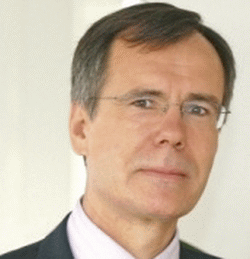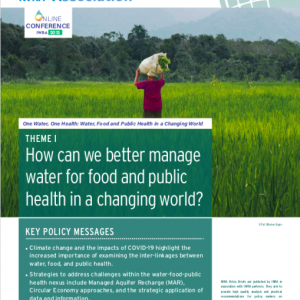Patrick Lavarde, IWRA President
Writing this editorial from the bustling charm of the Senegalese capital Dakar where I am attending a meeting of the World Water Council, it is difficult not to be heartened by the positive effects of successful water resources management on the region. Straddling four countries – Guinea, Mali, Mauritania and Senegal – the Senegal River Basin represents elements of the best cooperative water resource management practices seen across the world. Borne out of a 1972 agreement during a period of catastrophic drought, the Commission that manages this crucial basin – which represents just over 1% of Africa’s landmass – has strengthened economies, environments, and minimised conflict.
That all dams built along its banks are properties shared by all participants – remarkable for a transboundary river – points to the need for equitable engagement. Indeed, the World Bank notes that “when countries jointly manage shared water resources, the benefits in terms of poverty reduction are significant”.
Developing nations from the ‘Global South’ present unique challenges in their management of water as well as their ability to adapt to climate change, and yet through close dialogue with regional neighbours the basin has fortified its resilience. But whilst great strides have been made, I am often reminded that we cannot rest on our laurels.
It is timely then, that the IWRA held a recent webinar on “Climate Change and Adaptive Water Management”. Produced alongside our friends at Canada’s International Research Development Centre (IRDC), the webinar built upon the recent special issue of Water International, “Climate Change and Adaptive Water Management: Innovative Solutions from the Global South”. Bringing together the IWRA’s most geographically diverse group of panellists ever, the emphasis centred on the need for ongoing research as well as crucial bottom-up engagement with all relevant stakeholders in these developing nations.
These issues are set to be expounded at the upcoming World Water Week in Stockholm to be held between 26 – 31 August 2018. The forum is set to focus on “Water, Ecosystems and Human Development” and will include a High-Level World Water Week Dialogue on building resilient nations through sound water policies. The IWRA will be there along with Amina J. Mohammed, Deputy Secretary-General at the United Nations, and other influencers in pushing for heightened collaboration and insight-sharing to fight the world’s most pressing hydrological challenges.
As part of our continued focalisation of climate change adaptation, IWRA Treasurer Renée Martin-Nagle was invited to attend the “Connections” conference organised by the University of Glasgow from 29 – 30 May. Renée presented her work on “Offshore Freshwater: The Ultimate Connector” during the session on “Contested Connections: A Swiftly Tilting Planet”. As countries – particularly those in the Global South – continue to grapple with the onset of climate change, her panel presentation was an invaluable contribution to the ongoing debate.
With a packed upcoming schedule, and as we pass the halfway point of 2018, I urge members to spur continued collaboration from amongst the international water community, as we strive to ensure that sound science and scientifically-grounded policies – not politics and misinformation – direct our water management.




